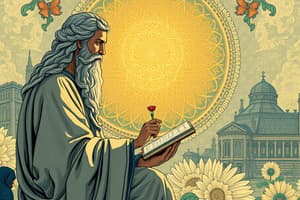Podcast
Questions and Answers
What is the main focus of partial thinking in philosophy?
What is the main focus of partial thinking in philosophy?
- Connecting ideas
- Understanding overall theories
- Exploring specific issues or arguments (correct)
- Creating a holistic picture
Holistic thinking involves looking at the individual parts without considering their relevance to the whole.
Holistic thinking involves looking at the individual parts without considering their relevance to the whole.
False (B)
What is one metaphor used to describe holistic thinking?
What is one metaphor used to describe holistic thinking?
A puzzle.
Holistic thinking is like being a detective, trying to solve a mystery by collecting _____ from different places.
Holistic thinking is like being a detective, trying to solve a mystery by collecting _____ from different places.
Match the following concepts of thinking in philosophy with their characteristics:
Match the following concepts of thinking in philosophy with their characteristics:
Which of the following best describes holistic thinking?
Which of the following best describes holistic thinking?
Holistic thinking in philosophy does not take into account the impact of different philosophical ideas.
Holistic thinking in philosophy does not take into account the impact of different philosophical ideas.
What should be considered when employing holistic thinking in philosophy?
What should be considered when employing holistic thinking in philosophy?
What was one of the reasons Socrates was put on trial?
What was one of the reasons Socrates was put on trial?
According to Plato, how can reality be detected?
According to Plato, how can reality be detected?
Plato's dialogues do not feature Socrates as a character.
Plato's dialogues do not feature Socrates as a character.
Empiricism asserts that knowledge can only be gained through intellectual reasoning.
Empiricism asserts that knowledge can only be gained through intellectual reasoning.
What are the two methods of acquiring reliable knowledge mentioned?
What are the two methods of acquiring reliable knowledge mentioned?
What did Heraclitus famously state about rivers?
What did Heraclitus famously state about rivers?
The Pythagorean theorem is attributed to ______.
The Pythagorean theorem is attributed to ______.
Philosophers who believe that knowledge is acquired through sense experience are called __________.
Philosophers who believe that knowledge is acquired through sense experience are called __________.
Match the following philosophers with their views on knowledge acquisition:
Match the following philosophers with their views on knowledge acquisition:
Match the philosopher with their contributions:
Match the philosopher with their contributions:
What does Plato refer to as the 'ideas of forms'?
What does Plato refer to as the 'ideas of forms'?
What is the focus of Plato's theory of Forms?
What is the focus of Plato's theory of Forms?
Heraclitus believed that change is an illusion.
Heraclitus believed that change is an illusion.
Induction focuses on forming general ideas from specific experiences.
Induction focuses on forming general ideas from specific experiences.
What did Parmenides emphasize regarding the nature of reality?
What did Parmenides emphasize regarding the nature of reality?
Name one way to distinguish between good and evil according to philosophical discourse.
Name one way to distinguish between good and evil according to philosophical discourse.
Plato's philosophy suggests that the physical world is not __________.
Plato's philosophy suggests that the physical world is not __________.
What is the primary focus of logic?
What is the primary focus of logic?
The Greek word 'logike' is associated with aesthetics.
The Greek word 'logike' is associated with aesthetics.
Which two pragmatists are mentioned in the discussion of pragmatism?
Which two pragmatists are mentioned in the discussion of pragmatism?
According to Aristotle, truth exists when the mind's mental representations correspond with things in the _____ world.
According to Aristotle, truth exists when the mind's mental representations correspond with things in the _____ world.
Match the term to its description:
Match the term to its description:
Who coined the term 'logike'?
Who coined the term 'logike'?
A person who has studied logic is less likely to reason correctly than one who has not.
A person who has studied logic is less likely to reason correctly than one who has not.
What does logical reasoning provide us with in terms of scientific proof?
What does logical reasoning provide us with in terms of scientific proof?
What is the fundamental purpose of philosophical reflection?
What is the fundamental purpose of philosophical reflection?
Socratic Method suggests that the unreflected life is worth living.
Socratic Method suggests that the unreflected life is worth living.
Who is referenced as stating that philosophical reflection gives time to think about the meaning and purpose of life?
Who is referenced as stating that philosophical reflection gives time to think about the meaning and purpose of life?
True learning requires knowing that one does not know, also known as __________.
True learning requires knowing that one does not know, also known as __________.
Match the following terms with their descriptions:
Match the following terms with their descriptions:
What does the process of reflection help to understand?
What does the process of reflection help to understand?
According to Fr. Roque Ferriols, philosophizing allows us to grasp the meaning of __________.
According to Fr. Roque Ferriols, philosophizing allows us to grasp the meaning of __________.
Philosophical reflection requires an individual to be passive in their learning.
Philosophical reflection requires an individual to be passive in their learning.
Study Notes
Socrates and His Trial
- Socrates was sentenced to death for "corrupting the youth" and "introducing new gods."
- He accepted his punishment and drank hemlock, a poisonous plant.
Plato's Contributions
- Plato (427–347 BCE) was a prolific writer known for dialogues featuring Socrates.
- He explored various subjects including ethics, metaphysics, and the theory of Forms.
- The theory of Forms posits a realm of perfect, unchanging concepts that underlie the imperfect physical world.
Heraclitus' Philosophy
- Heraclitus (c. 535–475 BCE) emphasized change, coining the idea that "everything is in a state of flux."
- He believed that unity exists in the tension of opposites.
Parmenides' Perspective
- Parmenides (c. 515–450 BCE) offered a contrasting view that focused on being versus becoming.
Holistic vs. Partial Thinking in Philosophy
- Holistic thinking involves understanding how various ideas fit together for a comprehensive view.
- Partial thinking focuses narrowly on specific issues without considering broader implications.
Plato's View of Reality and Knowledge
- Plato believed reality is eternal, unchanging, and can only be understood through intellect or reason.
- He categorized true knowledge into types: empirical (from senses) and rational (from logic).
Knowledge Acquisition Methods
- Induction: Gaining knowledge through specific sensory experiences; associated with empiricists like John Locke.
- Deduction: Involves reasoning from general principles to specific cases, crucial for logical argumentation.
Truth and Logic
- Aristotle defined truth as the alignment of knowledge with reality.
- Logical reasoning ensures our conclusions are sound and substantiated by evidence.
Philosophical Reflection
- Philosophical reflection involves examining thoughts, feelings, and actions to derive meaning and purpose in life.
- An unexamined life, according to the Socratic method, is not worth living.
What is Philosophizing?
- Philosophizing entails deep thinking to comprehend reality and find insights beyond surface appearances.
- True learning requires understanding the significance of knowledge rather than mere rote obedience to authority.
Studying That Suits You
Use AI to generate personalized quizzes and flashcards to suit your learning preferences.
Related Documents
Description
Explore the key events surrounding Socrates' trial, his condemnation for corrupting the youth, and the introduction of new gods. Additionally, delve into the attribution of the Pythagorean theorem to Socrates, along with its historical context. This quiz covers fundamental concepts in ancient philosophy and mathematics.




